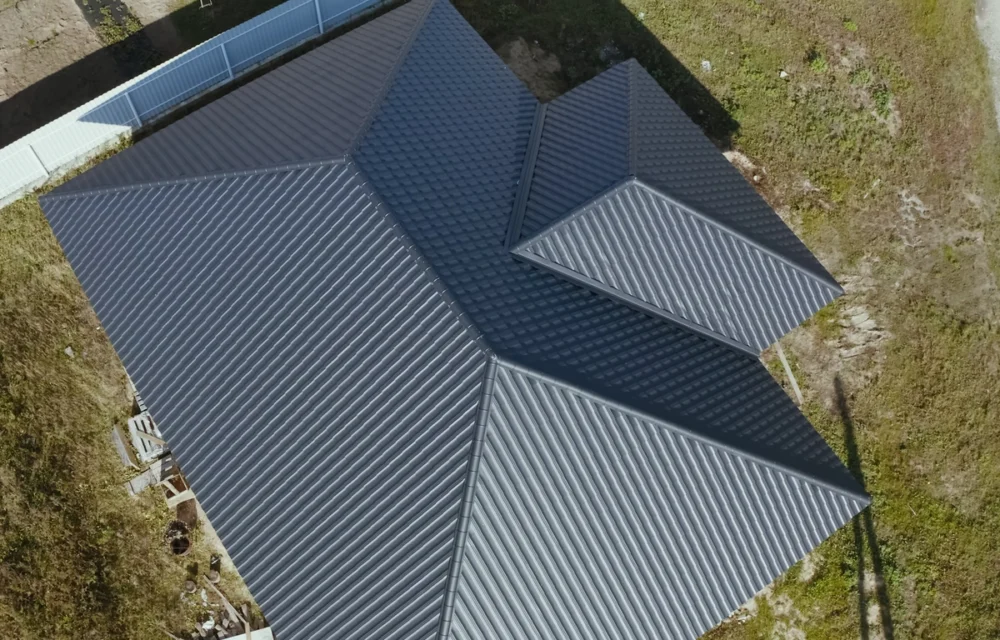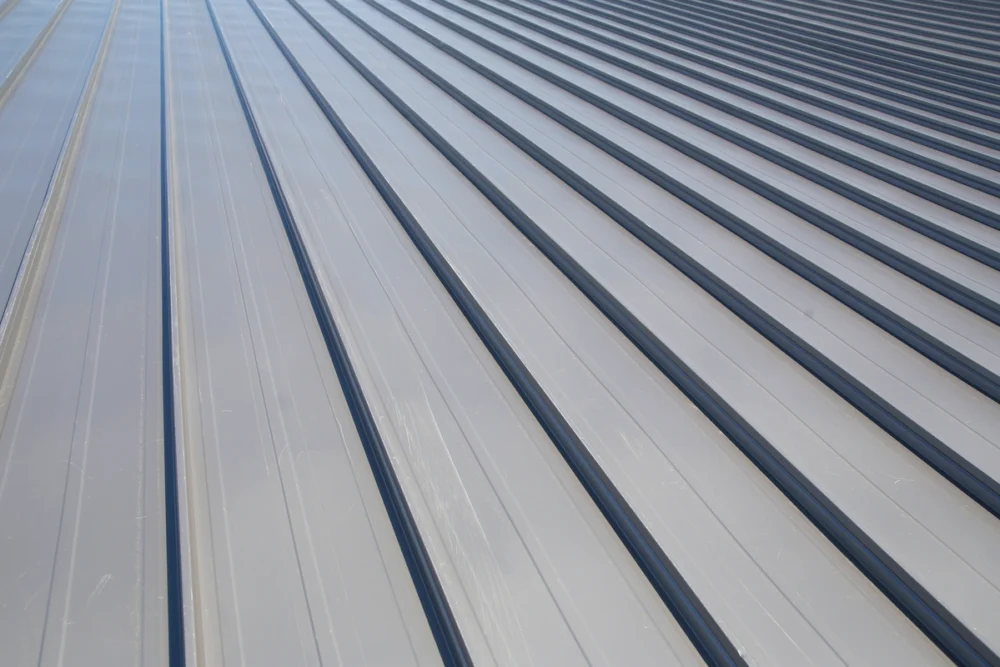If you’re considering a metal roof for your home, you’ve likely heard the term “metal roofing gauge”—but what does it actually mean? And why does it matter?
Metal roofing is known for its durability, energy efficiency, and modern aesthetic. But choosing the right gauge (thickness) is critical if you want your roof to stand up to your region’s weather and last for decades.
In this guide, we’ll break down:
- What gauge means in roofing
- The most common gauges used today (22–29)
- How to choose the right thickness for your climate, budget, and home type
- The pros and cons of different metal materials like steel, aluminum, copper, and zinc
Let’s start with the basics—what gauge actually measures, and why it matters more than most people think.
🛠 What Is Metal Roofing Gauge?
In simple terms, metal roofing gauge refers to the thickness of the metal used to make your roof panels. The lower the gauge number, the thicker and stronger the metal.
Here’s a quick comparison:
- 22-gauge: One of the thickest options—extremely durable and weather-resistant
- 24-gauge: Common on residential and commercial metal roofs
- 26-gauge: Most commonly used for residential roofs in areas with moderate climates
- 29-gauge: Thinner and more affordable, ideal for sheds or buildings in mild climates
To put this in perspective: a car hood is about 20-gauge thick, while a soda can is around 37-gauge. The choice of gauge affects everything from durability and storm resistance to price and appearance.
Knowing what gauge your home needs depends on local weather conditions, your home’s structural support, and your budget.
Understanding Lower Gauge Material (Thicker Panels)

Lower gauge = thicker metal. If you’re considering 22- or 24-gauge panels, you’re choosing a heavier, stronger roof that excels in durability—especially in harsh weather.
Why Choose a Lower Gauge?
- Withstands strong winds and hail better than thinner metal
- Ideal for homes with wide rafter spacing or structural gaps
- A smart choice in areas with heavy snow loads—thicker panels resist bending or sagging
While lower gauge metal roofing is more expensive, it often pays for itself in performance and long-term protection.
Pro Tip: If you live in Indiana or the Midwest, this thicker option is worth considering due to frequent storms, snow, and high wind zones.
Understanding High Gauge Material (Thinner Panels)
Higher gauge = thinner metal. The 29-gauge panel is one of the most affordable options and is commonly used for detached garages, sheds, barns, or homes in milder climates.
When Is a Higher Gauge a Good Fit?
- You live in a mild weather region with little snow or wind
- You’re covering a non-living structure (like a pole barn)
- You need a cost-effective solution
However, it’s important to know that thinner panels:
- Won’t last as long as lower gauge options
- Are more susceptible to dents from hail or debris
- May not meet local building code for residential homes in some areas
Pro Tip: In places like Indiana—where snow, hail, and wind are common—higher gauge roofing may only be a short-term solution unless installed on well-protected structures.
Factors to Consider When Choosing a Metal Roofing Gauge
There’s no single “best” gauge for every home. The right metal thickness depends on your climate, structural needs, and budget. Here are the key factors we assess during a consultation:
1. Local Weather Conditions
- Areas with frequent storms, hail, or snow? Go with a lower gauge (22–26) for added strength.
- Milder climates can often get by with a 29-gauge panel if the roof is well-supported.
2. Building Structure & Support
- Homes with wider rafter spacing or older framing may need thicker panels to reduce sagging.
- Thinner gauges may work if installed over solid decking with tight support.
3. Budget and Financing
- Thinner panels cost less upfront, but may need replacing sooner.
- Thicker panels are more durable, and we offer financing options to help fit them into your budget.
Pro Tip: Local building codes may restrict minimum gauge thickness for residential homes. Always check before buying—or let us handle that for you.
Cost is going to play a big role as well in your decision of what gauge metal roofing you purchase. Obviously, you’re only going to be able to purchase what your budget allows. However, you may be able to enjoy a lower gauge metal roof if you choose an appropriate metal that fits within your budget. Our company offers financing options for our customers on approved credit so you can get the appropriate metal roof without inconveniencing yourself.
The Four Types of Metal Roofing Materials
Metal roofing isn’t one-size-fits-all. The material you choose will affect everything from cost and appearance to performance and lifespan. Here’s an overview of the four most commonly used metal roofing materials.
1. Copper
Copper roofing offers unmatched longevity and a high-end appearance, making it ideal for homeowners who want a long-term investment with visual appeal.
- Develops a natural patina over time, starting shiny and aging into a green hue
- Extremely durable and naturally corrosion-resistant
- Lightweight and energy-efficient, but among the most expensive options
2. Zinc
Zinc is a premium roofing material that’s becoming more common in the U.S. due to its eco-friendliness and ability to self-heal scratches over time.
- Naturally corrosion-resistant and forms a self-protective patina
- Long-lasting and low maintenance
- Can produce a chalky residue over time that may affect appearance
3. Steel
Steel is the most widely used metal for roofing due to its strength, cost-effectiveness, and wide availability in various finishes and gauges.
- Strong, fire-resistant, and affordable
- Comes in galvanized, Galvalume, or pre-painted finishes
- Heavier than aluminum and more likely to rust without protective coating
4. Aluminum
Aluminum is lightweight, corrosion-resistant, and ideal for homes near the coast or in regions with high humidity.
- Excellent at resisting saltwater corrosion
- Easier to install due to its flexibility and light weight
- More expensive than steel and more prone to denting
Note: Gauge numbers vary by metal type. A 26-gauge steel panel won’t be the same thickness as a 26-gauge aluminum or copper panel—always compare apples to apples.
It’s essential to note that each different roofing material has its own standards for characterizing its gauges. This means that a 26-gauge steel roof is going to be a different thickness than a 26-gauge copper or even an aluminum roof. Our experts will not only discuss your specific situation with you over the phone, but we’ll come out and see what we’re working with and base our advice on the environment of your property, cost and personal preference. To determine the specific gauge roofing you should be getting, will depend on the type of roofing material that you decide to use.
What Gauge Is Most Common?
While the right gauge depends on your climate and structure, some gauges are used more frequently than others in residential roofing.
- 29-gauge is commonly used for homes in mild climates or for detached buildings like garages and sheds. It’s the most affordable, but less durable.
- 26-gauge is the most common standard for residential homes in areas with snow, hail, or strong winds. It offers a balance of cost and performance.
- 24-gauge is often used on commercial roofs or premium residential installs where higher strength and longevity are needed.
Local building codes may also dictate the minimum allowed gauge, especially in areas with extreme weather or stricter standards.
If you’re not sure what’s required in your area, a roofing contractor like Indy Roof & Restoration can assess your home and help you choose the right material and thickness.
Ready to Choose the Right Gauge for Your Metal Roof?
Choosing the correct metal roofing gauge isn’t just about cost—it’s about protecting your home from the elements while ensuring long-term value. At Indy Roof & Restoration, we work closely with homeowners to recommend the best gauge and material based on local weather patterns, building codes, and budget. Whether you’re replacing an aging roof or planning a new installation, our expert team is here to help you make an informed, confident decision. We also provide residents with storm damage, insurance claims, and commercial roofing services. Simply contact our office today to get the helpful assistance that you need.



